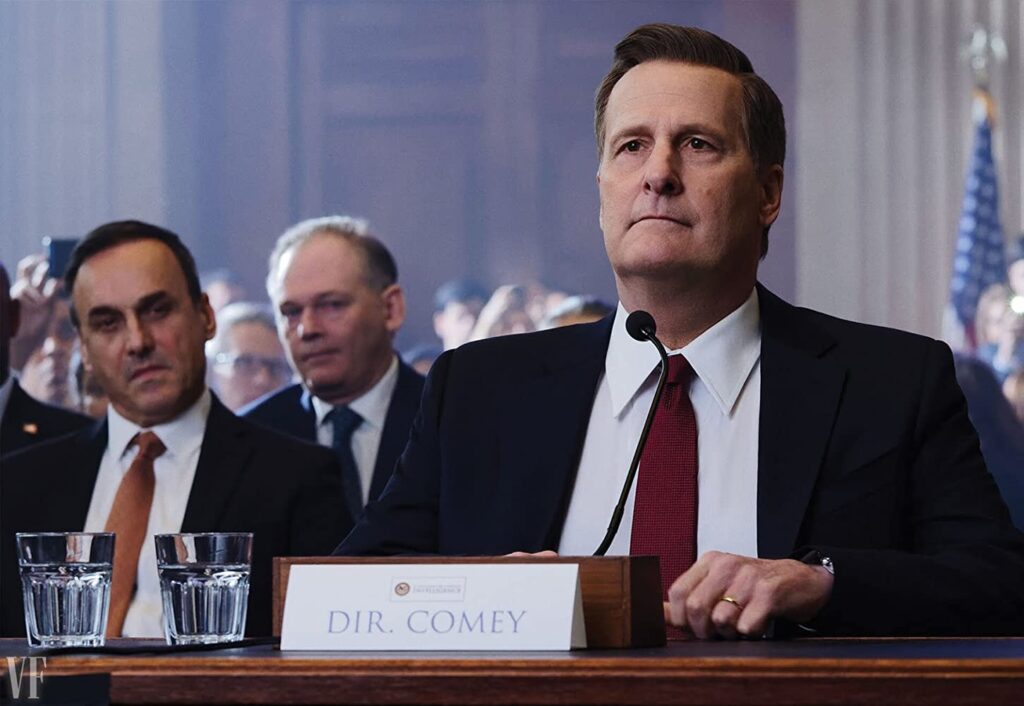When Showtime originally announced a post-election air date for The Comey Rule — its two-part adaptation of A Higher Loyalty, the Trump administration tell-all by former FBI director James Comey — writer-director Billy Ray was keenly disappointed. “We all were hoping to get this story in front of the American people months before the coming election,” he wrote in an email to cast members. Ray ultimately got his wish (Showtime moved the premiere to Sunday, Sept. 27), but it’s hard to imagine that Comey, polished and well-acted as it is, will sway many hearts and minds. Those who support Donald Trump are highly unlikely to watch, and those who don’t — well, a dramatic re-enactment of the events surrounding the 2016 election may feel less like entertainment and more like ideological torture porn.
Emmy winner and impeccable TV bureaucrat Jeff Daniels stars as Comey. He’s a lawyer and by-the-book government official — the type of guy whose suits are all the same shade of serious, and who won’t cut the line at the FBI cafeteria even after President Obama (played here by Kingsley Ben-Adir) appoints him as the bureau’s director in 2013. In his first speech to the FBI troops, Comey urges his employees to maintain a work-life balance: “I order you to love someone,” he says. “It’s the right thing to do.” His staffers — including Bill Priestap (Shawn Doyle), Andrew McCabe (Michael Kelly), Lisa Page (Oona Chaplin), and Mark Giuliano (Brian d’Arcy James) — adore him.
If this is all beginning to sound like the TV series equivalent of a puff piece… enter Scoot McNairy! (Comey Rule is nothing if not a prestige showcase for the world’s finest male character actors.) The Halt and Catch Fire star plays Deputy Attorney General Rod Rosenstein, a.k.a. the man wrote a memo outlining Comey’s “mistakes” shortly before Trump fired him. Ray uses Rosenstein as a combination narrator and devil’s advocate; he’s one of the few figures depicted who attributes Comey’s decision making to something other than patriotism and naiveté. “In governance there are people who do the work and there are showboats,” Rosenstein tells a staffer in Rule’s opening scene. “Jim was always a showboat.”

Part one of The Comey Rule chronicles the FBI’s investigation into Hillary Clinton’s use of a private email server, a fraught endeavor that thrust the traditionally apolitical bureau into the vortex of a toxic presidential race. Meanwhile, the FBI begins tracking “anomalous activity” by the Russians on Facebook, which agents suspect could involve attempts to sabotage Clinton’s presidential campaign. The miniseries does a decent job laying out the overwhelming confluence of developments Comey and his team face — conflicts with Attorney General Loretta Lynch (Michael Hyatt) and Deputy AG Sally Yates (Holly Hunter) over the Clinton email inquiry, news of a well-sourced dossier chronicling candidate Trump’s alleged misconduct in Russia, the Democratic National Committee email leak, and so on — in a relatively digestible fashion. Cameras circle grim-faced government officials as they gather around shiny conference tables, tensely debating how best to ensure the future of democracy.
For Comey, the Midyear inquiry, as the Clinton investigation was known, led to two career-defining/ruining moments. In a stunning break with bureau protocol, he chose to give a press conference explaining the FBI’s decision not to press charges, and one month before the election, Comey insisted on alerting Congress that the investigation was being reopened due to new evidence — despite the very real risk that the news would unfairly tip the scales in Trump’s favor.
The chief conflict in Comey Rule comes down to one question: Was James Comey a true patriot forced into increasingly impossible situations, or an egomaniac with an “I alone can fix it” attitude who helped get Donald Trump elected? That question remains largely unanswered, even as the miniseries transitions into the Trump administration era in part 2. James Comey, both in reality and as portrayed by Daniels, is an extremely self-possessed man. It’s a quality that likely served him well as head of the FBI, but it’s not as helpful for the protagonist of a dramatic series. Even in his most devastating moments of professional turmoil — when, for example, President Trump (Brendan Gleeson) summons Comey to a private dinner and growls, “I expect loyalty” — Daniels-as-Comey remains an impassive wall of inscrutability. There are external signals of distress, of course: the slow camera push-in, the minor chords quivering quietly on the soundtrack. All these things tell us that something bad is happening, but we knew that already.
Whenever Comey Rule hints at a point of view, it tilts pro-Comey — unsurprising, given the source material. Though Rosenstein pops up throughout the series to cast the FBI director’s actions in a harsh light (“If he’d just been a little humbler, a little less certain that his morality was all that mattered… the world wouldn’t know my name today”), Ray portrays him almost like the Salieri to Comey’s Mozart. He resents Comey’s success, his easy rapport with underlings, the devotion he inspires in his team. But his assertions that Comey is a phony, a guy driven by ego over duty — they exist in a vacuum, leaving us to draw whatever conclusions we drew years ago.
As Trump, Gleeson arrives in part 2, appropriately bewigged and be-oranged. He skillfully replicates the president’s meandering cadence, his labored breathing, his pursed lips and jutted jaw. He interprets real-life Comey’s interpretation of real-life Trump’s intentions with suitable menace. But again, who is it for? For the pro-Trump crowd, The Comey Rule is destined to be dismissed as more #FakeNews from liberal Hollyweirdos. For everyone else, it offers the uniquely punishing experience of repeating history even as we continue to live through it. B-









